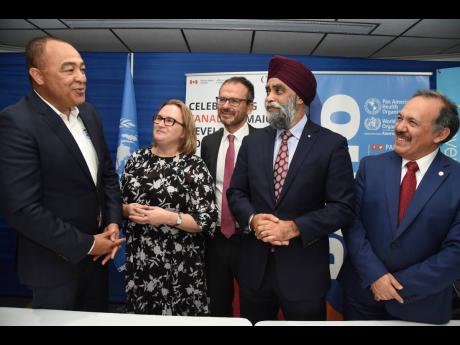Canada announces millions in COVID-19 support for Latin America, Caribbean
Some people have suggested that the coronavirus (COVID-19) pandemic is over; no more precautions, restrictions, or changes in behaviour compared with the period of time before it started. People have grown weary of restrictions, and those sceptical about their value, continue to ignore recommendations and create the impression that the pandemic is over, even as significant numbers of daily cases and deaths continue in the United States and worldwide.
Many pandemics eventually become endemic, meaning the infection is still present in a region or population but its behaviour is predictable and the numbers of cases and deaths no longer spike. Learning to live with a virus is a key feature of an endemic virus; think flu or even the common cold. But it is probably true that the transition from pandemic to endemic can only be recognised after it happens.
Perhaps setting a firm end date on this pandemic doesn’t matter, anyway. What matters most is the number of ongoing infections, suffering and death, and the measures we should take to avoid infection. No one can say whether the upcoming months will bring a decline in infections, a continuation of the current situation, with hundreds of deaths and thousands of new infections each day in the United States, or a spike in illness and death as more people are inside with relaxed precautions.
Recently, Jamaica’s COVID-19 and health response received a boost valued at approximately CAD$10.2 million, equivalent to approximately J$1.15 billion under Canada’s Global Initiative for Vaccine Equity (CanGIVE).
Under CanGIVE, the government of Canada will support COVID-19 vaccination and response in 12 countries globally, of which three countries are in Latin America and the Caribbean. In Jamaica, CanGIVE will enhance vaccine delivery and distribution, and reinforce efforts to build vaccine confidence among high-risk groups where coverage remains low. Canada will work with implementing partners, the Pan American Health Organization (PAHO) and UNICEF in the Latin America and Caribbean region.
Harjit Sajjan, Canada’s minister of international development, said Canada’s partnership with PAHO will help to increase access to COVID vaccines, especially for people in vulnerable situations, including women and girls.
“Although we may wish we could turn the page on COVID-19 altogether, we know it is not that simple. There is still work to do to control the spread of the virus, move into recovery, and build stronger health systems so we can be better prepared for future crises,” Sajjan said.
Working with long-standing partners at UNICEF, he said will help make sure COVID vaccines are delivered and distributed equitably, to those who are most at risk.
Minister of Health and Wellness Dr Christopher Tufton said the funds under the CANGIVE initiative is indeed timely as it provides a well-needed boost and new energy to increase awareness and to let Jamaicans realise that COVID-19 is not over.
“CanGIVE promises strengthened capacity among healthcare workers to deliver COVID-19 vaccination through, among other things, improved policy and human resources. It also takes on board gender-responsive services and the improved ability to develop rights-respecting information systems and digital platforms for surveillance,” Tufton said.
PAHO is set to receive CAD$45 million under CanGIVE, a renewal of Canada’s commitment to PAHO’s regional COVID-19 response, adding to the previously distributed CAD$50 million.
Dr Ciro Ugarte, director of health emergencies at PAHO, said while the Americas represents only 13 per cent of the global population, as of January 10, it accounts for 28.3 per cent of the total cases reported and 43.3 per cent of the reported deaths worldwide. As such, COVID-19 remains much deadlier in the Americas than in any other region.
The results of PAHO’s existing partnership with Canada since 2021 have strengthened cold chain operations which, in turn, has facilitated the distribution of COVID-19 vaccines. In collaboration with the Ministry of Health and Wellness, PAHO has also increased operational capacity for the deployment and surveillance of COVID-19 vaccines in the field.
“The continued partnership with Canada will enable PAHO to ensure at-risk populations such as the elderly, people with chronic diseases, pregnant women, and healthcare workers receive the COVID-19 vaccines that they need for protection,” Ugarte said.
UNICEF will also receive an additional CAD$70 million to support all 12 countries under CanGIVE. Vicente Teran, acting UNICEF representative to Jamaica, welcomed this initiative. “UNICEF’s work in the region will be greatly enhanced as we strengthen the systems to deliver improved healthcare, especially for children,” he said.

